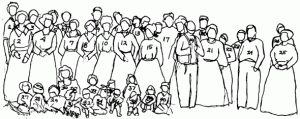
Stacks of my brand new EMDR memoir were on display in the front window of our local bookstore. Boxes of books had begun arriving from the printer, smelling faintly chemical, their bindings so tight they creaked when I opened them.
I got to sign the first two copies of Every Moment of a Fall to my San Francisco therapists, Connie Rubiano and Jan Cehn. We met to celebrate its release a few days before my first reading and book signing. We laughed ourselves silly, reminisced about the moments in therapy that stuck out for each of us, marveled at how far we’d come together, how much awareness of EMDR has grown since Jan and I did our sessions together. Anyone observing us would have seen nothing out of the ordinary, just three women having lunch, getting a little loud, talking with our hands.
It felt completely, conspicuously normal. I was a normal woman, like them, eating Chinese food on a Tuesday afternoon. Not a head case. Not a sad, self-loathing PTSD statistic. I was myself, easy and released from trauma. I was completely Carol, owning my name: song of joy. My fortune read, “No obstacles will stand in your way this coming week.”
All the flurry and excitement of the launch of my book—at last!—was thrilling, scary, goose-bump inducing. But maybe the best part was noticing, in the sunny window of that restaurant, how fine I felt. I was ready to share my story. Ready to look people in the eye, speak my truth and not feel judged or shamed.
In one of her columns for O Magazine, the awesome Martha Beck cites this life-changing zinger from spiritual teacher Byron Katie: “When I walk into a room, I know that everyone in it loves me. I just don’t expect them to realize it yet.” Beck challenges her reader to try that concept on for size. “Imagine how you’d enter a public space,” she writes, “if you knew without a doubt that everyone in it adored you. How would you move? How would you look at people? What would you say?”
That’s what I resolved to do. I would enter those bookstores, stride to each podium certain that everyone in the audience loved me, whether or not they knew it yet. And guess what? They actually do. They flood me with their love, listening so attentively to my story. Asking such thoughtful questions. Coming up to tell me that I read beautifully, that my words let them experience a piece of what I lived.
I guess sometimes you just gotta roll with it: you’re A-Ok. And surrounded by love.
That’s what I’d say if came face to face with the woman who emailed me recently to thank me for writing this blog and publishing my EMDR memoir. EMDR has helped her tremendously, it turns out. So has my story. She wrote:
Thank you for having the courage to tell your story! I hope great things from it for you and countless others. . . .
I recently latched onto the thought, which has become almost an obsession, to put MY story out there, as well. It is because of the silence that the problem has gotten this far!!! And I find anyone suspect who discourages us from putting it out there! There is a reason they want us silent. . . .
I don’t have your vast experience and education, and I’ll probably never write the book I’ve dreamed of writing to share my story with the world. But reading yours makes me know that it’s no small thing to have lived an entire lifetime without true love, from and for myself, and from others.
I want her to know that she is heard, and loved—by all kinds of people who might not have realized it yet. Or are just beginning to. I bet you’ve already begun to love her yourself, reading her heart-rending words.
She sent a follow-up email to tell me that she’d kept a printed copy of one of my blog posts with her at all times “to remind myself I was not alone.”
I wrote back to tell her how incredibly thankful I am that a piece of my story made her feel like she didn’t have to go it on her own. There are so many of us walking around with similar stories, I reminded her. Far too many. Not every one of us is going to write a memoir. But whenever and however we let those stories out into the light, we become part of that light ourselves—and part of one another as well.
We are many. When we find our voices, instead of keeping silent, we are mighty. We remind one another that we walk in the world worthy of love—normal, everyday, anywhere, just-fine love.


